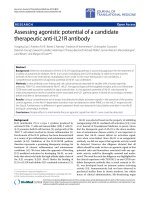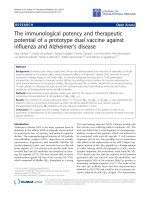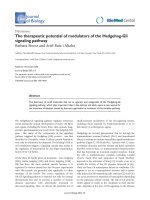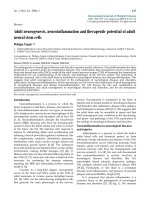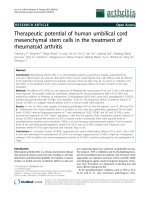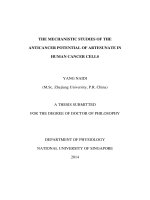THERAPEUTIC POTENTIAL OF NICOTINE
Bạn đang xem bản rút gọn của tài liệu. Xem và tải ngay bản đầy đủ của tài liệu tại đây (74.96 KB, 7 trang )
THERAPEUTIC POTENTIAL OF NICOTINE
ANNOUNCEMENT:
•
Data in the presentation doesn’t belong to us. We simply present
our summary from a number of research of other researchers.
•
Investigation and research on Nicotine is rare. Only some of the
information below is newly updated.
•
Nicotine’s effect on health is still in research. We don’t recommend
anyone to try it for self-treatment without professional advice. The
presentation is for educational purposes only.
INTRODUCTION:
Script:
Nicotine is always believed to be a detrimental substance due to its
association with smoking. It is the most well-known ingredient of
tobacco, which makes cigarettes become highly addictive. This makes
the real health benefits of nicotine are often overlooked or even
suppressed. Only lately, Nicotine has been investigated for its
therapeutic potential for a long list of common ills. The list includes
Alzheimer disease, Parkinson disease, depression and anxiety,
schizophrenia, attention deficit hyperactivity disorder (ADHD), and even
pain and obesity.
TABLES OF CONTENTS
CONTENTS
OVERALL
THERAPEUTIC POTENTIAL OF
NICOTINE
increased sympathetic
nervous system activity like
1. Nicotine and the Brain
an elevated heart rate and
a. Nicotine helps improve
concentration
blood
pressure.
b. Potential therapeutic
agents
for rewarding
cognitive and
o Nicotine’s
THERAPEUTIC
2
dysfunction
POTENTIAL OF
addictive qualities are
NICOTINE
thought
2. Nicotine and weight
gain to be linked to its
ability to cause increased
dopamine levels in areas
NICOTINE
3
FUTURE
like the nucleus accumbens.
o Nicotine also increases
4
CONCLUSION
acetylcholine release, which
might contribute to the
enhanced attention and
So, let’s have an overview about
cognitive function
this special substance.
associated with its use.
1
OVERVIEW
I.
OVERVIEW:
o Nicotine is the main
psychoactive component of
tobacco. It primarily exerts
its effects by binding to
nicotinic acetylcholine
receptors in the central and
peripheral nervous system
in brain, muscle, and many
other tissues of many
organisms. The resultant is
release of a variety of
neurotransmitters.
o Nicotine acts on nicotinic
acetylcholine receptors in
the peripheral nervous
system, where it can lead to
II.
THERAPEUTIC
POTENTIAL OF
NICOTINE:
PAGE 2
1. Nicotine and the Brain
a. Nicotine helps improve concentration
- People with depressive-spectrum disorders, schizophrenia,
and adult with ADHD tend to smoke heavily, which suggested
to researchers that nicotine may soothe their symptoms.
Similarities between all these disorders is a failure of
attention, an inability to concentrate on particular stimuli.
As we have mentioned above, Nicotine also increases
acetylcholine release, which might contribute to the enhanced
attention and cognitive function associated with its use.
- Researchers at the National Institute on Drug Abuse have
shown via functional magnetic resonance imaging that
nicotine activates specific brain areas during tasks that
demand attention (*). This may be because of its effects,
shared with many other addictive drugs, on the release of the
neurotransmitter dopamine.
b. Potential therapeutic agents for cognitive dysfunction
Many research has shown that smokers also have lower rates of
neurodegenerative disorders, and nicotine improves cognitive
and motor functioning in people with Parkinson disease (*) and
Alzheimer disease (**).
(*) Parkinson develops when cells in the brain stop working
properly and are lost over time. These brain cells produce a
chemical called dopamine. The brain uses dopamine to help
control movement, everything from walking to talking, writing to
smiling. Eventually, the brain cannot make enough dopamine to
control movement properly. This is when symptoms start to
appear.
(**) Alzheimer is the most common form of neurodegenerative
disease, meaning it is characterized by the degeneration and
death of neurons. Alzheimer’s most often affects adults over the
age of 65. It includes difficulty in sleeping, disturbed memory,
drastic mood changes and increasing confusion. Cause of the
disease are not well understood.
We want to mention again that: Nicotine has been proved to cause
increased dopamine levels.
And, the prevailing hypothesis is that nicotine increases release of
neurotransmitters depleted in those diseases.
Researchers are now wondering that malfunctioning of the
dopamine system may be affecting noncognitive aspects of
dementia such as depressed mood, and that this might be
alleviated by nicotine.
Scirpt: Nicotine's beneficial effects in patients with
neurodegenerative and -mental disorders have been studied a lot
and are fairly well-known. A much newer topics of academic
research is nicotine's potential for treating obesity.
b. Nicotine and weight gain:
Nicotine may be the most effective drug around for weight control.
As ex-smokers know, to their rue, one of the worst things about
quitting cigarettes is putting on pounds—as much as 10% of body
weight. “Something about being addicted to nicotine and then
going off it causes massive increase in weight,” Lorna Role and
her colleagues at Columbia University in New York City (1998)
points out.
In 2002, Ph.D [Doctor of Philosophy] Young-Hwan Jo from Albert
Einstein College of Medicine has assumed that Nicotine may
presumably be involved in changing perception and motivation for
eating. In 2003, Ming Li and his colleagues at the University of
Texas in San Antonio, Texas suggest that, among its other effects,
nicotine alters fat storage.
Additionally, nicotine or nicotinic receptor agonism can
simultaneously modulate food intake, in terms of both homeostatic
and hedonic components. (Mineur and colleagues, 2011; Picciotto
& Mineur, 2013)
FUNFACTS:
Although always been blamed for causing addiction among
smokers, Nicotine is mainly used to help treat dependence on
smoking cigarettes. This form of treatment is called nicotine
replacement therapy (NRT). NRT products contain less nicotine
than cigarettes, and they do not contain many of the harmful
chemicals typically found in cigarettes, which can come in the
form of patches, gum, lozenges, inhalers, and nasal sprays.
SIDE EFFECTS OF NICOTINE:
Along with the possible advantages of nicotine, in fact, it might
cause a range of effects on both the body and mind, including:
Decreased user’s appetite, abnormal sleep disturbances, or
heightened mood. Using Nicotine can also increase heart rate and
blood pressure, accompanied by sweating. Sometimes, it might
cause nausea.
III.
NICOTINE’S FUTURE:
Why has interest in this potential cure-all been slow to develop?
One reason: in its current forms the drug offers pharmaceutical
companies no possibility of substantial profit. In other words,
research on Nicotine brings back relatively minimal benefits.
Developing new drugs that selectively target specific subtypes of
nicotine receptors is an expensive, albeit potentially lucrative,
proposition. And therein lies a question. Will nicotine-based
therapy consist mostly of costly new drugs from the
pharmaceutical industry? Or can less expensive nicotine products
like the patch, chewing gum, and nasal spray—which are generally
intended for smoking cessation but widely available, usually
without prescription—find their way into the world's medicine
cabinets?
Another, perhaps more important: the drug is regarded as the
world's most addictive.
IV.
CONCLUSION
In conclusion, we want to emphasize that ample evidence has
suggested that chronic nicotine use by vaping is associated with
increased odds of myocardial infarction, stroke, and circulatory
problems, as seen in cigarette smokers (Mayyas and colleagues,
2020; Moheimani and colleagues, 2017). However, it appears that
short-term nicotine use might be reasonably safe and can be
relatively beneficial. Its development is one of the most promising,
elegant, and smart strategies for weight management, several
mental illnesses and neurodegenerative disorders.
QUESTION:
1. I have read on the Internet that Nicotine are investigated on
its pain relief ability. Have you do any research about it? Can
you tell us a little bit?
Nicotine itself has provided modest pain relief in animal studies.
And now, nicotine is being investigated as an analgesic in humans.
Pamela Flood, an anesthesiologist at Columbia has said in her
research (Dec. 2004) “The nice thing about nicotine and drugs like
nicotine is that they have opposite side effects to anesthetics.
Instead of being respiratory depressants, they are respiratory
stimulants. Instead of being sedating, they increase alertness.”
2. Why is nicotine called poison?
Poison, in biochemistry, a substance, natural or synthetic, that
causes damage to living tissues and has an injurious or fatal
effect on the body, whether it is ingested, inhaled, or absorbed
or injected through the skin. And, Nicotine itself is a dangerous
neurotoxin. It is poisonous if ingested, even handling the plant
leaves can cause health problems such as headache, nausea,
vomiting, and fatigue.
3. Is there any other use of Nicotine?
Pesticide
Recreational: e-cigarettes
